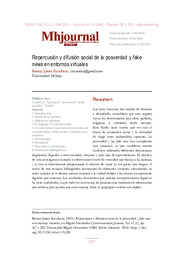Por favor, use este identificador para citar o enlazar este ítem:
https://hdl.handle.net/11000/26375Registro completo de metadatos
| Campo DC | Valor | Lengua/Idioma |
|---|---|---|
| dc.contributor.author | Juárez Escribano, Beatriz | - |
| dc.date.accessioned | 2022-03-28T09:12:21Z | - |
| dc.date.available | 2022-03-28T09:12:21Z | - |
| dc.date.created | 2021-01-31 | - |
| dc.identifier.citation | Vol. 12 (2021) | es_ES |
| dc.identifier.issn | 1989-8681 | - |
| dc.identifier.uri | http://hdl.handle.net/11000/26375 | - |
| dc.description.abstract | Los seres humanos han tratado de aferrarse a identidades monolíticas que cree seguras como las determinadas por ideas políticas, religiosas o culturales desde siempre. Este fondo tiene mucho que ver con el deseo de aceptación social y la necesidad de elegir entre inabarcables opciones. La posverdad y las fake news han complicado esta situación, ya que modifican nuestra conducta utilizando diferentes dimensiones lingüísticas, llegando a crear mentiras, rumores y todo tipo de especulaciones. El objetivo de esta investigación consiste en determinar el nivel de veracidad que damos a las noticias, y si esta es directamente proporcional al número de votos (o me gusta) que tengan. A través de una revisión bibliográfica documental de diferentes mensajes encontrados en redes sociales, se evidencia nuestra renuncia a la verdad debido a las escasas competencias digitales que tenemos. Los resultados demuestran que nuestro comportamiento digital se ha visto modificado, ya que cada vez son menos las personas que contrastan la información que reciben, provocando que estas noticias falsas se propaguen mucho más rápido | es_ES |
| dc.description.abstract | Humans have tried to cling to monolithic identities that they believe to be safe as determined by political, religious or cultural ideas. This has a lot to do with the desire for social acceptance and the need to choose among endless options. The post-truth and the fake news have complicated this situation, since they modify our behavior using different linguistic dimensions creating lies, rumors and all kinds of speculation. The objective of this investigation is to determine the level of truthfulness we give to the news, and if it is directly proportional to the number of votes (or likes) they have. Through a documentary bibliographic review of different news found on social networks, our renunciation of the truth is evidenced due to the limited digital competencies we have. The results show that our digital behavior has been modified, as there are fewer people who contrast the information they receive, causing this false news to spread much faster. | es_ES |
| dc.format | application/pdf | es_ES |
| dc.format.extent | 17 | es_ES |
| dc.language.iso | spa | es_ES |
| dc.publisher | Universidad Miguel Hernández de Elche | es_ES |
| dc.rights | info:eu-repo/semantics/openAccess | es_ES |
| dc.rights | Attribution-NonCommercial-NoDerivatives 4.0 Internacional | * |
| dc.rights.uri | http://creativecommons.org/licenses/by-nc-nd/4.0/ | * |
| dc.subject | conducta | es_ES |
| dc.subject | fake news | es_ES |
| dc.subject | posverdad | es_ES |
| dc.subject | redes sociales | es_ES |
| dc.subject | verdad | es_ES |
| dc.subject.other | CDU::3 - Ciencias sociales | es_ES |
| dc.title | Repercusión y difusión social de la posverdad y fake news en entornos virtuales | es_ES |
| dc.title.alternative | Repercussion and social difussion of post-truth and fake news in virtual environments | es_ES |
| dc.type | info:eu-repo/semantics/article | es_ES |
| dc.identifier.doi | 10.21134/mhcj.v12i.350 | - |
| dc.relation.publisherversion | https://doi.org/10.21134/mhcj.v12i.350 | - |

Ver/Abrir:
350-Texto del artículo-5277-2-10-20210131.pdf
620,97 kB
Adobe PDF
Compartir:
 La licencia se describe como: Atribución-NonComercial-NoDerivada 4.0 Internacional.
La licencia se describe como: Atribución-NonComercial-NoDerivada 4.0 Internacional.
.png)